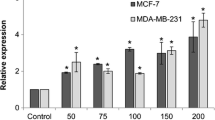Summary
Lipotropes, a methyl group containing nutrients, including choline, methionine, folic acid, and vitamin B12, are essential nutrients for humans. They are important methyl donors that interact in the metabolism of one-carbon units and are essential for the synthesis and methylation, of deoxyribonucleic acid. The purpose of this study was to examine the effects of excess lipotropes on the growth of a human breast cancer cell line, MCF-7, and normal mammary cells, MCF-10A, in culture. Both cell lines were grown in basal culture medium for 24 h and then switched to medium supplemented with 50 times the amount of each lipotrope as basal culture medium (control). Although there were no significant differences in growth between treatments in either cell line, gene array and Northern analysis revealed that expression of bcl-2 was decreased in lipotrope-treated MCF-7 cells. The ability to induce tumor, cell death could have many uses in the prevention and treatment of cancer. Bcl-2 regulates apoptosis and has been shown to directly affect the sensitivity of cancer cells to chemotherapy agents, and it is suggested that strategies designed to block Bcl-2 might prove useful in sensitizing tumor cells to chemotherapy-induced apoptosis. This study shows that although excess lipotropes do not inhibit the growth of breast cancer cells, they can down-regulate the bcl-2 gene, suggesting that lipotropes may increase the susceptibility of breast cancer cells to anticancer drugs.
Similar content being viewed by others
References
Baik, M.; Park, C. S. Regulation of c-fos and ornithine decarboxylase, mRNA levels by estrogen and 5-azacytidine. In Vitro Cell. Dev. Biol. 28A:75–76; 1992.
Barry, M. A.; Behnke, C. A.; Eastman, A. Activation of programmed cell death (apoptosis) by cisplatin, other anticancer drugs, toxins and hyperthermia. Biochem. Pharmacol. 40:2353–2362; 1990.
Choi, C. B.; Baik, M. G.; Keller, W. L.; Park, C. S. Lipotrope-modified diets enhance nitrosomethylurea-induced mammary carcinogenesis in female rats. Nutr. Cancer 20:215–221; 1993.
Choi, C.; Baik, M.; Sung, C.; Keller, W.; Park, C. S. Altered expression of oncogene and ornithine decarboxylase (ODC) activities in rats fed lipotrope-modified diets. FASEB J. 5:A925; 1991.
Dole, M.; Nunez, G.; Merchant, A. K.; Maybaum, J.; Rode, C. K.; Bloch, C. A.; Castle, V. P. Bcl-2 inhibits chemotherapy-induced apoptosis in neuroblastoma. Cancer Res. 54:3253–3259; 1994.
Institute of Medicine, National Academy of Sciences, USA. Dietary reference intakes for folate, thiamin, riboflavin, niacin, vitamin B12, pantothenic acid, biotin, and choline. Washington: National Academy Press; 1998.
Moon, Y. S.; Keller, W. L.; Park, C. S. Dietary lipotrope-mediated mammary carcinogenesis in female rats. Nutr. Res. 18:1605–1614; 1998.
Moon, Y. S.; Park, C. S.; Kim, S. H. Lipotrope-mediated c-jun and ornithine decarboxylase mRNA expression in mammary acinar cells. In Vitro Cell. Dev. Biol. 32A:313–314; 1996.
Park, C. S.; Choi, C. B.; Baik, M. G.; Keller, W. L. Modulation of expression of fos and Ha-ras oncogenes and ornithine decarboxylase activity in mammary gland and liver of young female rats by the absence of dietary lipotropes. J. Dairy Sci. 77:2214–2220; 1994.
Silvestrini, R.; Veneroni, S.; Daidone, M. G., et al. The Bcl-2 protein: a prognostic indicator strongly related to p53 protein in lymph node-negative breast cancer patients. J. Natl. Cancer Inst. 86:499–504; 1994.
Sumantran, V. N.; Ealovega, M. W.; Nunez, G.; Clarke, M. F.; Wicha, M. S. Overexpression of bcl-xs sensitizes MCF-7 cells to chemotherapy-induced apoptosis. Cancer Res. 55:2507–2510; 1995.
Wu, D.; Keller, W. L.; Park, C. S. Lipotrope deficiency inhibits cell growth and induces programmed cell death in human breast cancer cell line MCF-7. Nutr. Cancer 32:13–19; 1998.
Wu, D. M.; Keller, W. L.; Park, C. S. Lipotropes alter casein gene expression in bovine mammary acinar culture. J. Nutr. Biochem. 10:455–457; 1999.
Author information
Authors and Affiliations
Corresponding author
Rights and permissions
About this article
Cite this article
Kim, H.H., Park, C.S. Lipotropes regulate BCL-2 gene expression in the human breast cancer cell line, MCF-7. In Vitro Cell.Dev.Biol.-Animal 38, 205–207 (2002). https://doi.org/10.1290/1071-2690(2002)038<0205:LRBGEI>2.0.CO;2
Received:
Accepted:
Issue Date:
DOI: https://doi.org/10.1290/1071-2690(2002)038<0205:LRBGEI>2.0.CO;2




